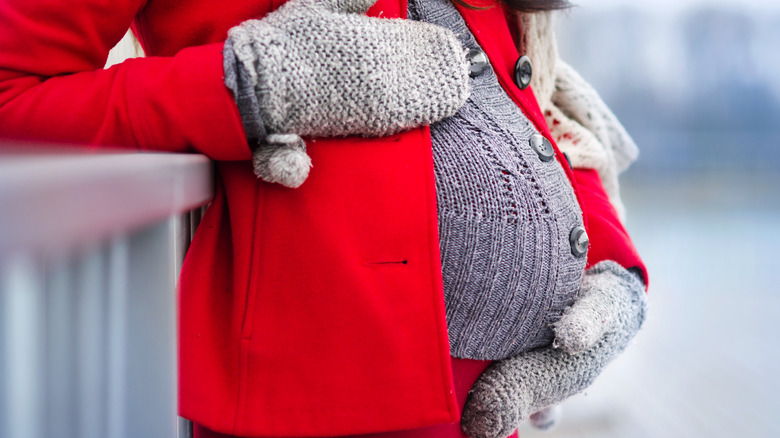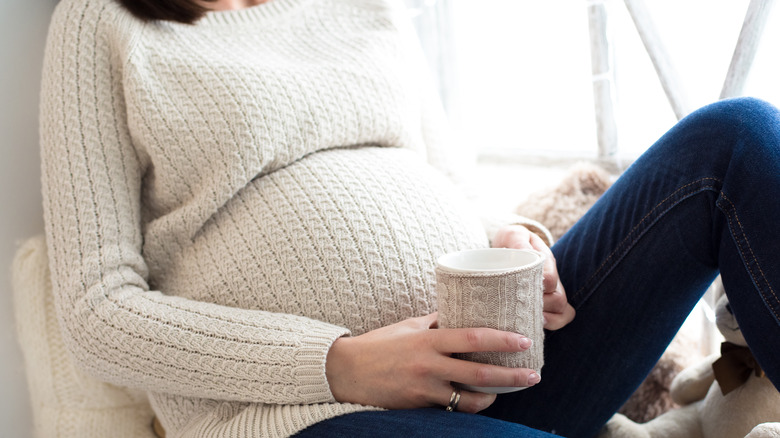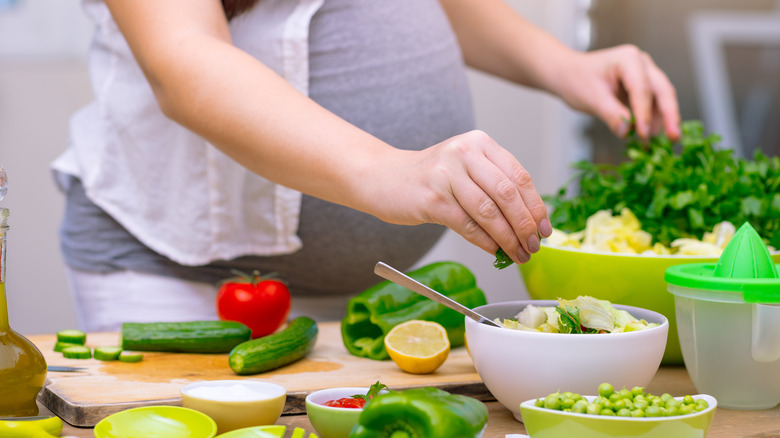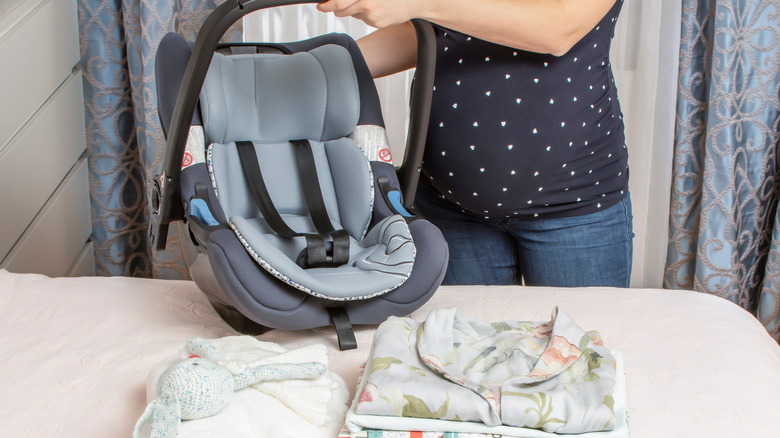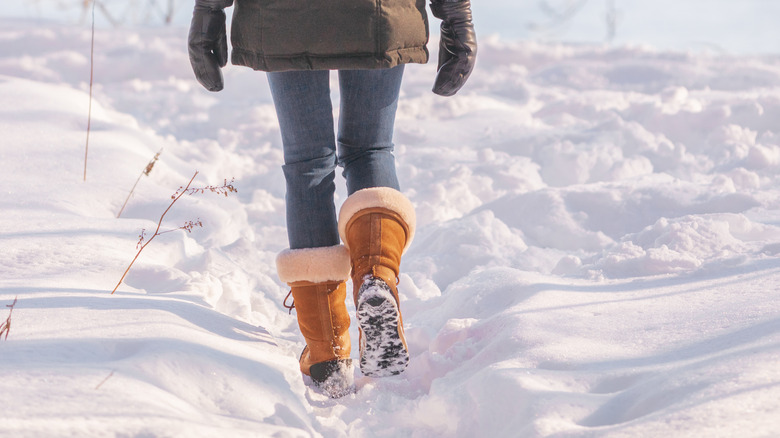15 Ways To Survive A Winter Pregnancy
When your winter coat is too tight, and you can barely squeeze into your winter boots, let alone reach your toes to tie up your laces, you may wish you were pregnant in any other season besides winter. Of course, pregnancy can be uncomfortable all year round, but being pregnant during winter can pose different challenges. Firstly, you must say goodbye to some of your favorite winter activities, like skiing down a steep slope or having a martini by the fireplace. Secondly, the lower temperatures also mean it's cold and flu season, and being pregnant makes you more susceptible to illnesses. According to health expert Jennifer Wider, MD, "the immune system is often in flux, and as a result, pregnant [people] may be more vulnerable to infections, including viral respiratory infections like COVID-19" (via Health). But don't fret! You can still do so many things to make the coldest season enjoyable.
As your bump grows and the weather gets colder, it's time to implement some winter survival tips to keep you and your baby safe and warm. Here are 15 practical ways to best survive winter when you're expecting.
Get your wardrobe winter ready
Baby, it's cold outside ... and your belly is growing, but your wardrobe is not. What do you do? The first step is to rearrange your closet, store away clothes that are too small, and keep items that are still functional, like ponchos, gloves, winter hats, and scarves. Next, it's time to invest in a maternity coat to help you keep cozy and comfortable. According to perinatal experts, you should avoid squeezing into a regular winter coat that you've had for years, especially if you're in your late second or third trimester (via NJ Perinatal Associates).
It's also essential to keep your legs warm and invest in maternity pants and versatile tops. Most maternity tops are also great for breastfeeding, so if you choose to purchase those, they will serve you well next fall and winter. Pregnancy is also when women's body temperatures fluctuate between being too hot or too cold; that's why wearing layers is a good idea (via NCT).
Switch to decaffeinated coffee and choose herbal tea carefully
One of winter's many joys is snuggling under a blanket by the fireplace and enjoying a warm winter beverage. But when you're pregnant, you must be careful which drinks you choose to enjoy. If you're a coffee lover, the good news is you can still drink coffee, but pregnant women are advised to limit caffeine to no more than 200mg a day which is about a 12-ounce cup of coffee. According to the American College of Obstetricians and Gynecologists (ACOG), caffeine is also present in some teas, chocolate, energy drinks, and soft drinks. For tea drinkers, the safest and most studied tea is Ginger tea, which is said to relieve nausea and vomiting, according to Healthline.
While some pregnant women switch to decaffeinated beverages, giving up coffee doesn't seem like an option for others. However, there is a bright side for coffee-drinking expectant mothers. One study from the University of Pennsylvania found that consuming a low amount of caffeine during pregnancy could help to reduce gestational diabetes risk. But the lead researcher, Dr. Stefanie Hinkle, advises pregnant women who are not already coffee drinkers to avoid coffee. She says the research is to reassure expectant moms who are already coffee drinkers. As for alcohol, well, that's a complete no go zone. According to the CDC, "there is no known safe amount of alcohol use during pregnancy." But the good news is mocktails and s'mores by the fireplace are not off-limits.
Stay active but choose the right winter activities
Pregnant women are encouraged to stay active during winter, and outdoor activities like walking and hiking are all considered safe. But, the most important thing to consider when outside during the winter is the correct footwear to reduce the chance of slipping and falling. In addition, if you choose to exercise outdoors, it's a good idea to look out for patches of ice, potholes, and sidewalk cracks (via UT Southwestern Medical Center).
Although yoga, pilates, lap swimming, and walking on a treadmill are safe and can be done indoors, pregnant women must say goodbye to higher-risk activities like downhill skiing and snowboarding. "Even if you're experienced on the slopes, your center of gravity is changing. It's best to avoid activities with a high risk of falling – especially in the last trimester," says Dr. Horsager-Boehrer in a blog post published by UT Southwestern Medical Center.
Remember to focus on your mental health
According to March of Dimes, studies have found that sustained high-stress levels in pregnant women can increase the chances of going into labor early and having a baby with low birth weight. That's why it is always important to seek medical help when you feel depressed, especially during pregnancy.
Winter blues can affect anyone, but when you're pregnant, hormonal fluctuations can make you more prone to feeling depressed in winter; this is known as seasonal affective disorder (via Providence). Obstetrician and gynecologist Dr. Sheryl. A. Ross urges all moms-to-be to seek help sooner rather than later if they are experiencing sadness or depression. Relaxation and light exercise can significantly help reduce mental health issues because taking care of your personal needs gives you extra mental strength and clarity in dealing with seasonal depression. "Relaxation activities include yoga, meditation, and mindfulness, help give you a sensible perspective on holiday stressors," Dr. Ross told Providence.
Stay warm and indoors if possible
Rug up and get cozy. A winter pregnancy is all about that incredibly comforting hygge feeling. Extreme temperatures, when expecting, may increase your risk of preterm birth, according to researchers at the National Institutes of Health, so do your best to avoid getting too cold or hot during a winter pregnancy is your mission.
It's advised to stay inside the house as much as possible to prevent slipping on ice and snow. Being at home can also protect you from the cold and is an excellent opportunity to prepare the nursery and tick as many tasks off your to-do list before the baby arrives. For some, staying indoors can be depressing, so exercise to boost mood and overall wellbeing is strongly recommended; a mix of yoga, pilates, and low-impact cardio are all great mood boosters that can combat the winter blues (via NJ Perinatal Associates).
Seek professional healthcare services and advice
From your mother-in-law to the stranger at the supermarket, when you're pregnant, you will encounter many people who mean well but will offer you unsolicited advice about how to best cope with pregnancy. It's essential to take this advice with a grain of salt, especially regarding your health. Each pregnancy is different, and only your healthcare provider is aware of your medical history and needs, so seek health advice and recommendations from experts following your journey and knowing your medical history.
During the winter, it's also essential to ensure that you get the proper vaccinations against the flu and follow any relevant CDC guidelines on protecting yourself from viruses including the common cold. According to the CDC, pregnant women are considered to be at high risk for flu complications, so it's always better to take precautions and ensure all your vaccinations are up to date.
Plan healthy meals
Although it is tempting to indulge in sweets and give in to pregnancy cravings, it's vital to maintain a well-balanced diet during pregnancy. According to the pregnancy experts at CaryOB/GYN, it's crucial to resist the urge to have processed, oily, and canned foods that can lead to heartburn. In addition, a balanced diet helps support a woman's overall well-being during pregnancy, especially since constant extra demands are placed on the body. "The goal is to balance getting enough nutrients to support the growth of your fetus and maintaining a healthy weight," per ACOG.
Winter fruits like oranges, apples, lime, guava, and apricots are nutritious. According to nutritionist Shivani Baijal, "during pregnancy, it is recommended to have vitamin C-rich foods to ensure better iron absorption in the body. These fruits are a great source of antioxidants and folate and are low in calories too" (via Healthshots). Baijal also recommends seasonal vegetables like carrots, sweet potato, and spinach during a winter pregnancy since they contain various unique health-boosting nutrients. To avoid excess snacking, it is essential to meal plan. As for eating for two, the ACOG says that's a dangerous mindset and recommends "eating twice as healthy" instead.
Moisturize your skin
Winter and pregnancy can wreak havoc on your skin. Fluctuating hormones and the cold climate can dry your skin. That's why moisturizing skin daily is recommended to keep skin hydrated, and it can also help alleviate itchiness. But hormones can affect your skin differently during pregnancy, causing acne for some women and dry, itchy skin for others (per NJ Perinatal Associates). Taking shorter showers and investing in a humidifier to keep the air moist is also beneficial to your skin during winter, according to Women's Care of Alaska.
For many pregnant women, hormone changes and dry skin exacerbate stretch marks. According to research, there isn't a one-size-fits-all solution to getting rid of stretch marks, but home remedies have not been scientifically proven to work. So, instead of wasting your money on home remedies, a better approach is to ask your medical provider to prescribe what is proven effective and safe during pregnancy. In addition, it's advised that pregnant or breastfeeding apply the lotions or creams as directed on early stretch marks because treatment is less effective on mature stretch marks (via AAD).
Plan your hospital route to avoid weather issues
Winter weather is unpredictable, so you don't want to be frantically looking for directions to the nearest hospital when your water breaks. You might hear cute stories about babies born in cars on the way to the hospital, but in reality, you want to be as prepared as possible to ensure you have the best medical care when your baby makes its grand entry into the world. Particular conditions like snowstorms mean you have to make sure you know the best route to the hospital as a precaution.
Signs may not be visible, and conditions may be icy, so practice runs to the hospital are a good idea. "It's also best to not only plan out a basic route but also a second route in case something was to happen," according to NJ Perinatal Associates. Car safety should also be a priority, so it's essential to ensure your tires are winter ready and, of course, always wear your seatbelt fastened securely to stay under your stomach, per Women's Care of Alaska.
Keep hydrated by drinking enough water
It's easy to remember to take regular sips of water when it's hot, but it's easy to forget the importance of keeping hydrated during winter. The importance, however, can't be understated due to the drying effects of winter weather. Staying inside, heaters, and wearing too many layers can cause dehydration, so pregnant women must increase their daily water intake.
Also, pregnant women require more water intake than the average person because, during pregnancy, water's incredible benefit helps produce amniotic fluid, creates extra blood, carries nutrients, and helps the healthy development of the baby's tissues and organs (via Women's Care of Alaska). There are many ways to remember to drink water, such as tying your water intake to an existing routine. For example, you may drink a glass of water every time you brush your teeth or before every meal (per Mayo Clinic Health System). The possibilities are endless!
Get more rest
Getting more rest might seem impossible for expectant moms who already have a child or children, but it's essential to make this a priority and ask family and friends for support. When you are pregnant, your body works overtime, and the effects can sometimes result in debilitating fatigue. As a result, it is more susceptible to illnesses, and particularly during flu season, so it's very important to embark upon a good self-care routine during winter. Winter is the perfect time that often provides downtime for relaxation. For pregnant women still working, going to the office when you feel unwell is never a good idea and can result in ill effects. According to NJ Perinatal Associates, "It's best to stay home and recuperate to let your immune system reboot. When you're pregnant, colds and other viruses can hit you harder, so you may end up feeling worse than usual."
Keep your feet warm in comfortable winter boots
When the weather outside is frightful, it's time to invest in some high-quality winter boots. Snow and ice can make the ground dangerous and slippery, which can be hazardous for pregnant women — so when staying indoors is not an option, a pair of non-slip boots is a necessity. But don't try and squeeze into your old boots if your feet are swollen. It's safer to shop for shoes that are larger (via City of Oaks Midwifery).
Dr. Crystal M. Newby advises having salt handy to sprinkle on your driveways and sidewalks to avoid falling on slippery ground. However, if you do fall during the winter, it's important not to panic because, according to Dr. Newby, "in most cases, it [a fall] won't cause damage to you or your baby." Always check with your doctor if you're concerned, per Kansas City ObGyn.
Be diligent about good hygiene
Being pregnant can be tiresome, and a cold or flu, on top of that, can be a bit too much to handle at times. That's why it's recommended that pregnant women be more careful to avoid germs, particularly during winter. According to Ob-Gyn, Dr. Parul Sathe, pregnant women can prevent illnesses by practicing good hygiene and washing their hands with soap and water. Dr. Sathe recommends maintaining distance from people and says it's a good idea to "stay away from people who are sick and avoid crowded places" (via Cary OB/GYN).
Additionally, ensuring to keep your kitchen clean and practicing good food hygiene during pregnancy can also help reduce your risk of contracting listeriosis (or listeria) and salmonella. It's essential to wash your hands before and after food preparation, keep kitchen surfaces clean, wash fruit and vegetables before eating them and cook food thoroughly, particularly meat and chicken.
Avoid hot baths, saunas, and steam rooms
Some of winter's pleasures include hot bubble baths, saunas, and steam rooms, but unfortunately, these activities can be quite unsafe during pregnancy. According to ACOG research, raising your body temperature, particularly early in pregnancy, may be linked with congenital disabilities. One study also found that women exposed to extremely hot or cold temperatures during the first seven weeks of pregnancy were 11 percent more likely to experience a preterm birth (via the National Institutes of Health). For this reason alone, pregnant women should consider the importance of keeping their body temperature regulated and avoid extremes one way or the other. The good news is there are many enjoyable ways to warm up during pregnancy, like having a warm mug of hot chocolate, staying indoors and enjoying a good book, sitting in front of a festive fireplace, or signing up for a warm oil pregnancy massage.
Ask for help from friends and family
Mental health issues impact 1 in 5 women during and after pregnancy (via AHA), and often reaching out for help early on can make a big difference. Winter conditions can be harsh, and trying to do it all at the expense of your physical and mental health can have a detrimental impact. Although asking for help can sometimes be a struggle for many pregnant women, learning to do so is essential both during and after pregnancy because it does take a village to raise a child. According to mental health expert Alyse Willett, LPC, asking family and friends for help makes others feel "included and appreciated." Instead of feeling like a burden when you need assistance, Willett says to see asking for help as a way of strengthening your relationship with others (per Behavioral Health Dallas). So if it's slippery or too cold outside, ask your partner, friends, or family to walk the dog and avoid hazardous tasks like shoveling the snow. After all, being unable to do everything has its advantages, so kick your feet up and enjoy a long nap while you still can.
